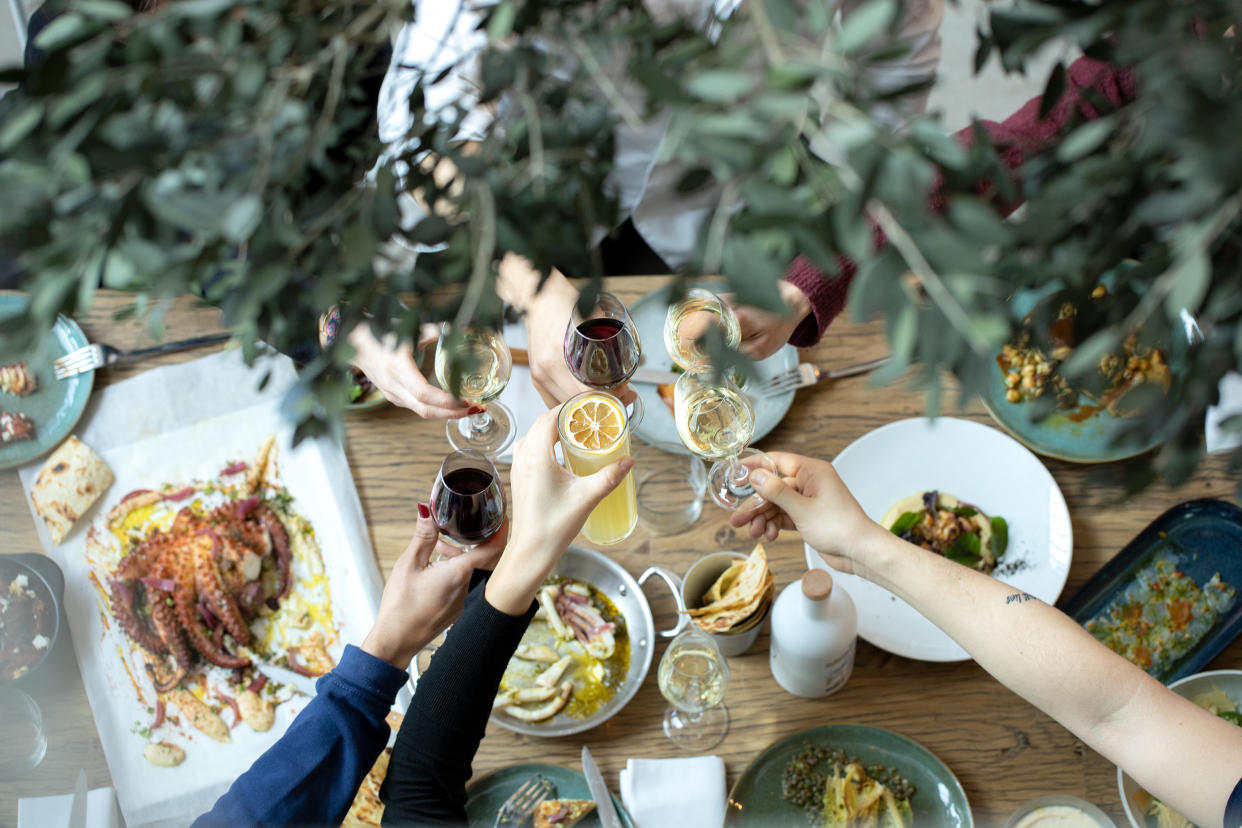Greek Restaurant Yaya Has Olive Oil Bread to Die For

PARIS — It all started with a soccer match.
Watching the 2014 World Cup game between Colombia and Greece, Bogota-born chef Juan Arbelaez started chatting to Pierre-Julien and Gregory Chantzios, the two brothers at the head of olive oil company Kalios.
Related stories
Lolita Chammah, Betony Vernon Among Front-row Faces at Alexis Mabille
Esteban Cortazar Collaborates With Philippe Model on Footwear Capsule
Alexis Mabille Celebrates First Restaurant, Froufrou
Colombia won 3-0. “Our relationship started with an enormous loss for Greece,” laughs Arbelaez, sitting in the newest outcome of the business partnership born that World Cup day: Paris-based Greek restaurant Yaya.
It’s Arbelaez’s sixth restaurant and the second in partnership with Kalios. The trio opened a first Yaya — the Greek word for “granny” — in a warehouse located in the Paris suburb of Saint-Ouen two years ago. This latest opening takes over a former market hall in the up-and-coming 19th arrondissement, minutes away from the trendy bars and cafés that have recently popped up along the Canal de l’Ourcq.
“I like to go where people don’t expect me,” explains Arbelaez, 31, who opened two of his first restaurants, Plantxa and Levain, in Boulogne, a quiet suburb to the west of Paris, and recently collaborated with designer Alexis Mabille to create the Belle Epoque-style restaurant of the Edouard VII theater in the 9th arrondissement.
Sprawling over two levels, Yaya is a vision of natural wood tables and deep blue painted walls. It could almost be zen — if one ignores the pumping music and festive atmosphere, punctuated by the energetic Arbelaez shouting jokes at Fanourios, the Greek chef who helped him put the menu together.
Arbelaez, who arrived in Paris when he was 18 years old and trained alongside Pierre Gagnaire and Eric Fréchon, is quite a star in France thanks to his turn in the first season of the French version of “Master Chef” in 2012. Prior to meeting the Chantzios brothers, who won him over with their family-produced range of artisanal olive oil, he barely knew anything about Greek cuisine. Their newfound friendship resulted in a trip to Neochori-Ithomi, the town in the Peloponnese region of Greece where the brothers’ family originates and where Arbelaez fell in love with the simplicity of Greek gastronomy.
“It’s an instinctive way of cooking,” says the chef, who shadowed the brothers’ grandmother and uncle to learn the family recipes. “One day, I went into a restaurant in a village near Kalamata where the chef was preparing a stew with a hare he’d just caught. I asked for the recipe: The chef told me to throw in carrots, tomatoes, a pinch of oregano, garlic and wait patiently until all the water had disappeared and all that was left is the oil on the top. No timing whatsoever. That’s what gives it such charm.”
If the first Yaya focused on dishes native to the Greek islands, with lots of fish and seafood-based offerings, the second installment is an ode to the mainland: meat lovers can share a massive wood-smoked lamb shank or Greek-style veal liver, while others can opt for braised calamari or the traditional “xilopitaki,” a herby, risottolike dish cooked in a shrimp broth.
The real star of the show is the olive oil bread. Firm and moist, covered in oregano and salt crystals, it’s impossible to resist, especially when paired with homemade taramasalata and Fanourious’ spin on the classic tzatziki, spiced with a dash of ouzo, the aniseed-based liquor, and a few sprigs of dill.
Arbelaez looks lovingly at the platter that is slowly being devoured before him. “We couldn’t decide what to call our sourdough starter. Fanis [Fanourious] wanted a Greek name, I wanted a Colombian one — so finally we settled on ‘Bebe’. We wrote its name on the pot, with its date of birth and everything. It’s alive, after all.”
A post shared by Juan Arbelaez (@juanarbelaezchef) on Feb 16, 2019 at 10:09am PST
Next up for Arbelaez is a project that will explore his Latin roots. “There are a couple of traditional Colombian restaurants in Paris, but I want to create something a bit fresher,” says the chef, who is also gearing up for Paris Fashion Week, during which he will stage a dinner for fellow Colombian Esteban Cortázar’s fall 2019 collection, and plotting his return to television screens.
According to him, it’s not surprising that Mediterranean cuisine is having such a moment in Paris. “Times are hard both economically and intellectually,” he says. “Terrorist attacks, the ‘gilets jaunes’ movement, the economic crisis — these are things you can’t help feeling. Mediterranean food, whether it’s Italian, Greek or Israeli, offers tasty dishes at an affordable price range, filled with joy and sunshine. For me, that’s the ultimate escapism.”
Get more from WWD: Follow us on Twitter, Facebook, Newsletter

